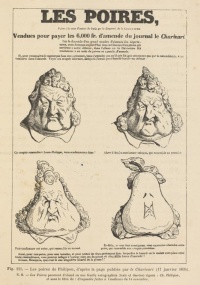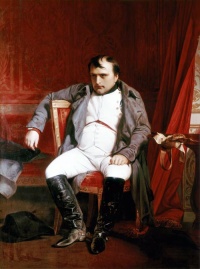Kingdom of France
From The Art and Popular Culture Encyclopedia

|
"To the revolutionaries, the execution of Louis XVI was a regicide, to royalists, it was deicide."--Sholem Stein The king is dead, long live the king! "Versailles [...] was the seat and tomb of the old dynasty of French monarchs, and has held a great place in the history of France."--Wonders of Architecture |

|
Related e |
|
Featured: |
The Kingdom of France is the historiographical name or umbrella term given to various political entities of France in the medieval and early modern period. It was one of the most powerful states in Europe from the High Middle Ages to 1848 during its dissolution. It was also an early colonial power, with colonies in Asia and Africa, and the largest being New France in North America centred around the Great Lakes.
The Kingdom of France was descended directly from the western Frankish realm of the Carolingian Empire, which was ceded to Charles the Bald with the Treaty of Verdun (843). A branch of the Carolingian dynasty continued to rule until 987, when Hugh Capet was elected king and founded the Capetian dynasty. The territory remained known as Francia and its ruler as rex Francorum ("king of the Franks") well into the High Middle Ages. The first king calling himself rex Francie ("King of France") was Philip II, in 1190, and officially from 1204. From then, France was continuously ruled by the Capetians and their cadet lines under the Valois and Bourbon until the monarchy was abolished in 1792 during the French Revolution. The Kingdom of France was also ruled in personal union with the Kingdom of Navarre over two time periods, 1284–1328 and 1572–1620, after which the institutions of Navarre were abolished and it was fully annexed by France (though the King of France continued to use the title "King of Navarre" through the end of the monarchy).
France in the Middle Ages was a decentralised, feudal monarchy. In Brittany and Catalonia (now a part of Spain), as well as Aquitaine, the authority of the French king was barely felt. Lorraine and Burgundy were states of the Holy Roman Empire and not yet a part of France. West Frankish kings were initially elected by the secular and ecclesiastical magnates, but the regular coronation of the eldest son of the reigning king during his father's lifetime established the principle of male primogeniture, which became codified in the Salic law. During the Late Middle Ages, rivalry between the Capetian dynasty, rulers of the Kingdom of France and their vassals the House of Plantagenet, who also ruled the Kingdom of England as part of their so-called competing Angevin Empire, resulted in many armed struggles. The most notorious of them all are the series of conflicts known as the Hundred Years' War (1337–1453) in which the kings of England laid claim to the French throne. Emerging victorious from said conflicts, France subsequently sought to extend its influence into Italy, but after initial gains was defeated by Spain and the Holy Roman Empire in the ensuing Italian Wars (1494–1559).
France in the early modern era was increasingly centralised; the French language began to displace other languages from official use, and the monarch expanded his absolute power in an administrative system, known as the Ancien Régime, complicated by historic and regional irregularities in taxation, legal, judicial, and ecclesiastic divisions, and local prerogatives. Religiously, France became divided between the Catholic majority and a Protestant minority, the Huguenots, which led to a series of civil wars, the Wars of Religion (1562–1598). The Wars of Religion crippled France, but triumph over Spain and the Habsburg monarchy in the Thirty Years' War made France the most powerful nation on the continent once more. The kingdom became Europe's dominant cultural, political and military power in the 17th century under Louis XIV. Throughout the 17th, 18th and early 19th centuries, France was Europe's richest, largest, most populous, powerful and influential country. In parallel, France developed its first colonial empire in Asia, Africa, and in the Americas.
In the 16th to the 17th centuries, the First French colonial empire stretched from a total area at its peak in 1680 to over 10,000,000 square kilometres (3,900,000 sq mi), the second-largest empire in the world at the time behind the Spanish Empire. Colonial conflicts with Great Britain led to the loss of much of its North American holdings by 1763. French intervention in the American Revolutionary War helped the United States secure independence from King George III and the Kingdom of Great Britain, but was costly and achieved little for France.
France through its French colonial empire, became a superpower from 1643 until 1815; from the reign of King Louis XIV until the defeat of Napoleon in the Napoleonic Wars. The Spanish Empire lost its superpower status to France after the signing of the Treaty of the Pyrenees (but maintained the status of Great Power until the Napoleonic Wars and the Independence of Spanish America). France lost its superpower status after Napoleon's defeat against the British, Prussians and Russians in 1815.
Following the French Revolution, which began in 1789, the Kingdom of France adopted a written constitution in 1791, but the Kingdom was abolished a year later and replaced with the First French Republic. The monarchy was restored by the other great powers in 1814 and, with the exception of the Hundred Days in 1815, lasted until the French Revolution of 1848.
See also

